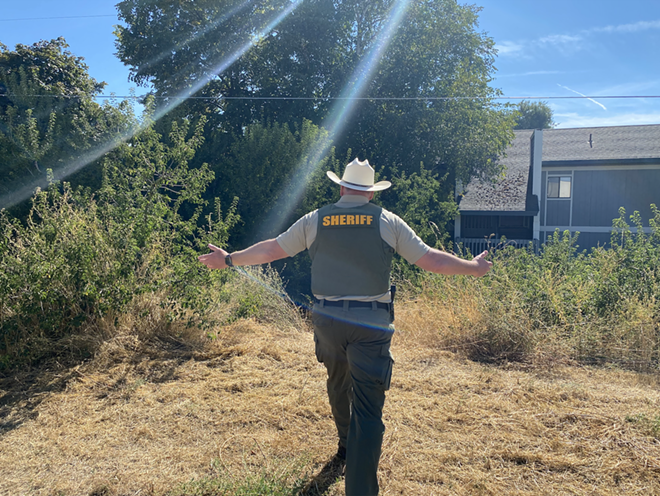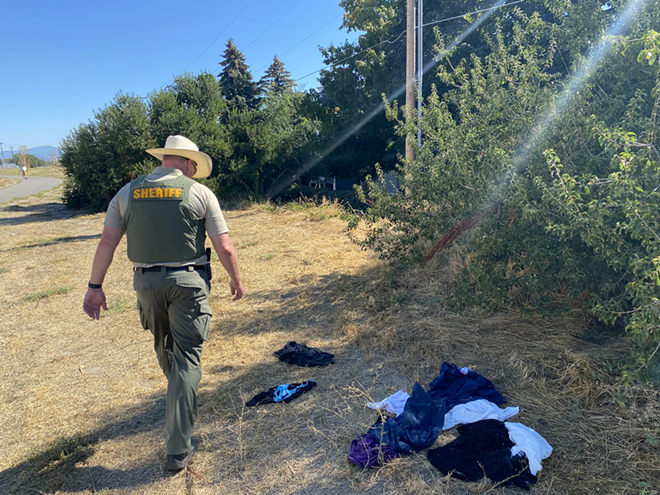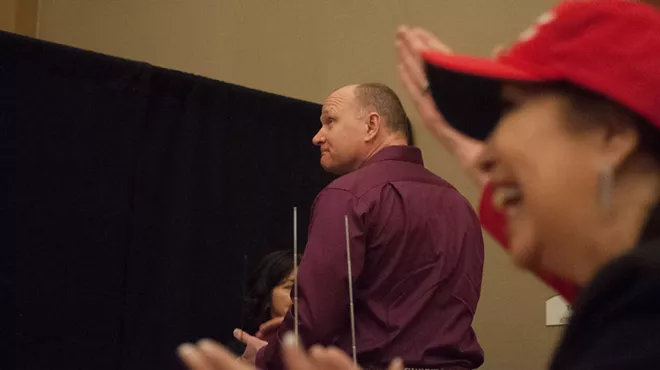
It’s just after noon on Sunday, and Ozzie Knezovich is on a quest to prove that a homeless camp isn’t real.
As the sheriff of Spokane County walks down Appleway Trail in Spokane Valley, not far from the intersection of University Road and Sprague Avenue, he notices a group of five or so people pushing a stroller and waves to them.
“Hey folks,” he says. “You seen any homeless in the area?”
“Tons, but not recently,” a man replies.
Knezovich asks them if they’ve seen 100 homeless people camping together. The man says they definitely haven’t. Maybe just two or three at a time. They live in an apartment complex a couple hundred feet away, and would’ve noticed such a large encampment.
“Well, one of your sheriff candidates said there was a group of 100 of them sitting here,” Knezovich says. “Which was a lie.”
He’s referring to Wade Nelson, a veteran of Knezovich’s force who is now running against Knezovich’s hand-picked successor, Undersheriff John Nowels. The men are running to replace Knezovich, who is leaving the office he’s been re-elected to four times after being appointed in 2006.
Nelson had been spreading the news that there was a camp of almost 100 homeless people in Spokane Valley, where Knezovich is strolling.
In fact, during a call with the Inlander two days before Knezovich’s walk on Appleway Trail, Nelson told Inlander about the 100-person camp, too. He questioned why the sheriff was choosing to focus his efforts on Camp Hope — an encampment in East Central with an estimated 600 residents that Knezovich has pledged to sweep by around mid-November — instead of fixing his “own problems.” Unlike Camp Hope, which is in the city of Spokane and technically not part of Knezovich’s usual jurisdiction, the alleged Appleway camp is in the Valley, which contracts with the county sheriff for police services.
About an hour after talking with Nelson, I referenced the Valley camp in a question directed at Knezovich during a press conference about the sheriff’s plans for Camp Hope. Later that day, the Spokesman-Review posted an article that included Nelson’s comments about the 100-person camp.
Knezovich, apparently, had had enough. On Saturday, he created a group chat that included Nelson and a handful of local reporters and sent a lengthy text message accusing Nelson of lying about the Spokane Valley camp.
“People need to ponder If you are willing to lie to get the job, what are you going to be willing to do to keep it,” Knezovich said in the text.
Nobody responded to the message.
Knezovich told Nelson and the reporters to meet him at the intersection of University and Sprague at noon the following day. Nelson is lying, the sheriff said, and he can prove it.
The next day, the sun is out, and Ozzie is wearing his uniform and a big cowboy hat.
“He lied to y’all,” Knezovich says, referring to the supposed homeless camp. I’m standing with the sheriff and a reporter from the Spokesman who wasn’t in on the group chat. Nelson isn’t there.
Indeed, I don’t see any sign of the homeless camp at the site Nelson mentioned. There’s an abandoned tarp near a public bathroom, and a few piles of clothes farther down the Appleway Trail, but no tents.
I called Nelson on Tuesday to get to the bottom of this non-existent homeless camp, and he clarified that he had heard about the campers from a local homeless advocate who said a group of 87 people camped out along the trail received meal service from a provider about a month ago. Nelson wouldn’t tell me the name of the homeless advocate, saying they feared retribution from the sheriff.

The bigger issue, Nelson says, is that Knezovich’s plan to clear Camp Hope is ill-considered and rash. He adds that he’s okay with clearing homeless camps.
Spokane Valley City Councilmember Tim Hattenburg says he was “taken aback” when he heard Nelson’s comments about the encampment. Hattenburg says he isn’t aware of any such encampment in recent months. The location Nelson described is just a few blocks from Spokane Valley City Hall, and Hattenburg says he absolutely would have heard something about it.
Hattenburg says the city has had challenges with people camping in the Dishman Hills area, and Nelson has spoken about those campers as well.
Hattenburg says he’s heard from constituents who feel that Knezovich came off too strong when he abruptly announced his plans to clear Camp Hope last week, but that he understands the sheriff’s frustration. He says Spokane Valley businesses near the City of Spokane border, which is just a few blocks away from Camp Hope, have expressed concerns about crime and violence.
“I can understand the situation, I think there’s a lot of frustration involved,” Hattenburg says.
Spokane Valley partners with a few churches that provide services to homeless people, but Hattenburg says the city doesn’t have any homeless shelters of their own. Spokane Valley does put a percentage of the money they make from fees towards shelters in the City of Spokane, which is often where campers go when cleared from encampments in the Valley.
Knezovich touts Spokane Valley’s homeless approach as tougher and more effective than what happens in Spokane. They don’t go in with a hammer, he says, but they do draw a line in the sand.
“The Valley does not tolerate what the city does,” Knezovich says.
After talking with the group of passersby on Sunday, Knezovich walks over to bushes to check for tents. There aren’t any. He points to a pile of discarded clothes.
“This is what they do with clothing that’s been given to them,” Knezovich says.
While Knezovich gladly tours the non-existent camp, he has yet to go to Camp Hope, which does very much exist. The sheriff lambasts the camp as dangerous and drug-ridden, and pushes back when I describe the conditions at the camp as “not ideal.”
“It’s disgusting, it’s unhealthy,” Knezovich says. “It’s not just ‘not ideal’— [it] is the worst-case scenario of human conditions.”
I invite him to go to the camp with me and he declines, saying it would become a “circus” if he visited.
But he does have plans to go there, or least his force does. Knezovich originally planned to clear Camp Hope by mid-October. On Tuesday, he said he was pushing the deadline back to sometime around Nov. 10. (He’s not giving an exact date because he’s worried about protesters showing up.)
In his letter pledging to sweep Camp Hope, Knezovich said his plan will involve providing “bus tickets to the location of each residents’ choice, allowing them to reunite with family and to assist them in recovery.” He will also “engage the faith community to help with drug, alcohol and mental health treatment.”
Last week, Empire Health Foundation President Zeke Smith told me the sheriff’s rhetoric was “discouraging” and making the situation less safe for residents. The plan, Smith said, also glosses over the fact that there simply isn’t enough shelter space for the camp's estimated 600-plus residents.
Volunteers are currently working to clear the perimeter of Camp Hope so they can work to put up a fence, which they hope will help address security concerns.
Knezovich isn’t a fan.
“Is that what your plan is? To make it look less deplorable looking?” Knezovich says. “Well you can put lipstick on that pig all day long, it’s still going to be a pig.”
Knezovich says he hopes everyone at the camp will accept the services he offers and leave voluntarily, but also calls himself a “realist” and notes that when the Trent shelter opened in September, only 13 Camp Hope residents chose to go that first day. Advocates note that homeless people are often hesitant to seek out shelters because of concerns about not being able to take pets or belongings, a lack of privacy, rules around drug and alcohol use, curfews, not being allowed to stay with partners, trauma and religious affiliation.
The sheriff frames the situation as one of personal accountability.
“They’re the ones who will make the final decision,” Knezovich says. “We don’t want to arrest anybody. We don’t want to do any of that.”
Knezovich says he isn’t worried about the sweep dispersing campers to other parts of the city because homelessness is already dispersed throughout the city.
The sheriff describes himself as the voice of East Central — a sort of neighborhood savior. He cites his past electoral victories and says he has a mandate from the citizens of Spokane County.
“The little people need to have a voice — I am their voice,” Knezovich says.
The sheriff describes Camp Hope as the result of “Marxism and socialism.” He thinks the campers — many of whom have physical or mental disabilities, criminal records, PTSD from years living on the streets and a host of other factors that impede housing and employment — need to take responsibility and work to pull themselves out of homelessness. He uses phrases like “personal accountability” and “hand up, not hand out," things he repeated this week during an appearance on Fox News’ morning show, Fox & Friends.
Knezovich, who is preparing to leave office after 16 years, isn’t worried that a massive encampment sweep will impact his legacy. He says his legacy will be stepping up to help when nobody else would. No, he isn’t worried about the possibility of the sweep causing damage because he insists it’s not going to cause damage. He says he’s already caused damage by allowing the camp to continue this long. The one thing that could hurt his legacy, Knezovich says, is leaving office without doing anything.
“I’m going to be a pain in these people’s necks until this is resolved,” Knezovich says. “If that means coming back up here in January and continuing my voice as an advocate, so be it.”






























